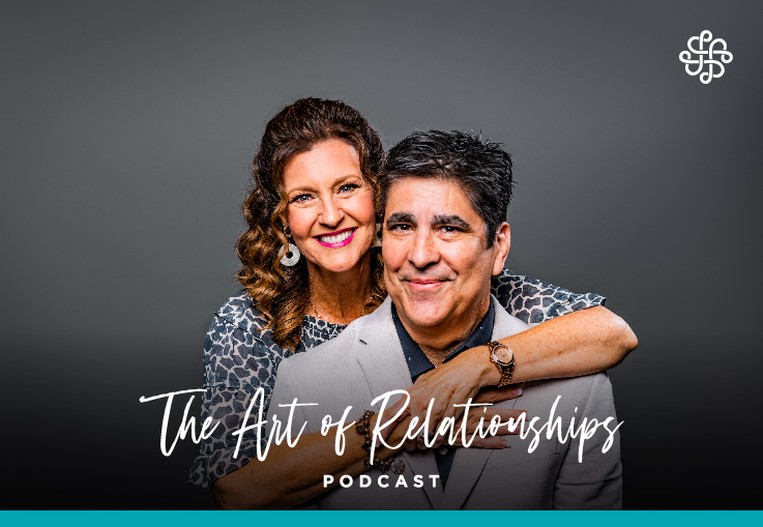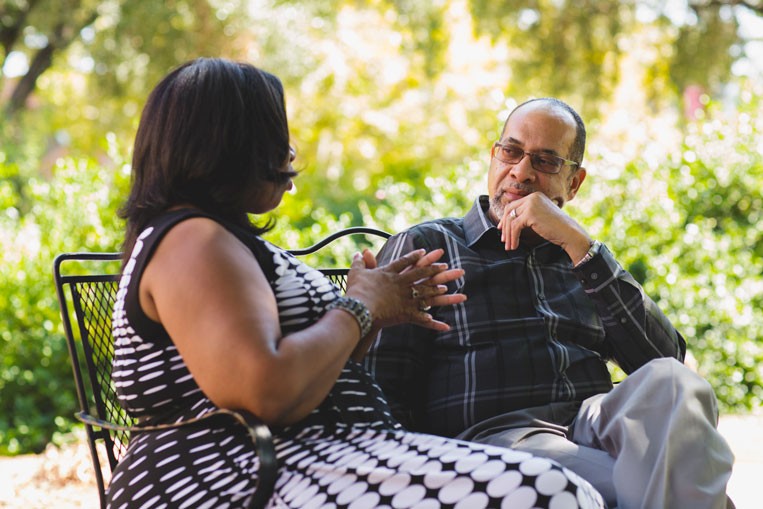Can My Significant Other Be My Accountability Partner?
The Art of Relationships Podcast - July 22, 2020
Topic: Communication, Counseling, Engagement

Chris and Tim got together over Zoom this week to answer listener questions on the Art of Relationships podcast. Today’s topic covers accountability partners: is it okay to be accountability partners with the person you are dating? What is the line between authenticity and oversharing?
Speaker 1: Welcome to another Art of Relationships podcast. We are grateful for listeners like you. Let's get right into it.
Chris Grace: Well, welcome to another Art of Relationships podcast. I'm Dr. Chris Grace and with me is Dr. Tim Muehlhoff.
Tim Muehlhoff: It's great to be with you Chris.
Chris Grace: It's great to be on this podcast with you, the Art of Relationships podcast. Do you know it's produced by Biola University Center for Marriage and Relationships, and it's just a joy Tim to do this together. We've been doing it for a couple of years now, and I just love it every time.
Tim Muehlhoff: Can you believe Chris we are listened to in over 70 different countries? That's amazing.
Chris Grace: Yeah. In fact, I saw the latest him it's even now increased to 130 countries, according to our last stats. Yeah, and we've been download 400,000 times already.
Tim Muehlhoff: Wow, that's great. Hey, we just want to give a big shout out to all of our listeners, thank you so much. We don't take this for granted. We love the fact that we can offer some input, have some great conversations. Hey, let me also mention that we're on iTunes. So if you would subscribe, comment, give us five stars. You can split up those stars. Give me three, give Chris two, give me four, give Chris one, but we sure appreciate your support, it makes a lot of difference in the stuff that we can do, so thanks again.
Chris Grace: Yeah, Tim, thanks too for the reminder. And one of the things we enjoy is getting feedback from listeners from all over. They send in questions from everywhere. Every State, it seems like in a couple of different countries. So Tim, I thought I'd read one that we just received and let's just go over it, what do you think?
Tim Muehlhoff: Great. Love it. I love these ask the experts. I love that our listeners feel the freedom to shoot us questions. We don't always know the answer, so we're giving you our opinion and stuff like that.
Chris Grace: Well, here we go. Let's start. Someone wrote in and said, "I am newly engaged to the love of my life. However, we are coming into a relationship with a lot of baggage. We have dated for four years and throughout our relationship, we've always had very strong and open communication because of this We started to become accountability partners and through that, I was starting to hear things that would hurt me and affect our relationship." So let's just pause, and then she says, "Forgiving was not hard to do, but the forgetting was." Tim, let's stop there and there's more to this question and we can add to it some other things she had asked, but what do you initially think? Newly engaged in their four year dating relationship, they held each other accountability. Tim, why don't you tell everyone what that means? What's accountability?
Tim Muehlhoff: Well, accountability can mean a lot of different things. Generally speaking, we pick an area, let's say finances or what we're looking at on the internet and we check in with each other, like how you are doing with watching movies on Netflix or Hulu? Are you going to certain sites that are inappropriate because you've communicated to me that you don't want to do that. So now I'm holding you accountable, holding you accountable for a credit card, it could even be spending time with the Lord. So you voice something that you want to have happen, but then you ask a person to join you and now that person checks in with you and you hold each other accountable.
I think it's great. I have an accountability partner. We've been accountability partners for almost 15 years here at Biola University and we hold each other accountable in a lot of different areas. He's a male, which we'll get into a little bit with different topics and the gender differences. But I think it's a great idea. So I say, hey, kudos to them. They've been dating for four years. I think it's great to be an accountability partner. I suspect that could work in a lot of areas. I have one reservation we'll get to, but I think generally speaking, I like accountability partners. What do you think Chris?
Chris Grace: Yeah, I do. I think it depends. It will take a relationship very deep, very quickly and that's just because you're talking about vulnerable areas and if you're being really honest and really dealing with the emotions that come with, let's say something that you need to be held accountable for, let's say it's pornography, then what happens is it can take that relationship in a couple of different ways. It could be they just dive into it too quickly because there's such a strong bond with somebody that you can share your heart with. But Tim, I also wonder just a little bit about even if it was these other topics, let's say it was a deeper, I don't know, maybe my love for God, maybe it's too powerful, to deeply spiritual for me to tell anybody about what God is speaking to me on. But when you do find someone like that, again, I wonder if this is what she's starting to hear things that bothered her about what he shared. What do you suggest? I mean, there's got to be boundaries when you're dating about accountability.
Tim Muehlhoff: Yeah, Chris, I think that's super insightful. So my accountability partner is a male friend, okay? We have a commitment to each other that we're in this together. But even with my male friend, I sometimes wonder if he's getting disappointed in me. Like, we're both followers of Jesus, we both have said spending time with the Lord is a top priority, so there are times obviously I go to my accountability partner and say, "You know what? This last month hasn't been very good. I just haven't made much time for God." I don't have a problem saying that to my male accountability partner.
Now let's say it's the woman I'm dating, there's got to be a little voice in my head Chris, that says, "Listen, I told her God's a priority and this last month I've really struggled making him a priority, but I don't want to lose this dating relationship. I love this dating relationship, so I'm going to pull back just a little bit and sanitize a little bit how I'm doing with the Lord." I think that's the danger of having a person you're dating be your accountability partner. It's always mixed audiences. Am I talking to my accountability partner? Am I talking to my girlfriend? That could be two different things and I think it can muck it up a little bit.
Chris Grace: Yeah, I think that's really helpful, Tim. Real insightful. This letter goes on. She said, "Forgiving was not hard to do, but the forgetting was." Tim, real quickly, the difference between forgiving and forgetting is pretty profound, right? God has us in a place where we are fully dependent on his forgiveness and even that strength to be able to forgive others. But it doesn't mean these hard things do go away. So any advice on that, that seems to be just a matter of time. And if it still continues to be, I don't know, maybe an obsession, you can't stop thinking about it then it might be something to talk through with a counselor if you're unable to forget and it's now impacting what you do day by day with your partner.
Tim Muehlhoff: Yeah. If I'm dating a person I ask the question, how honest can I really be before it starts to jeopardize the dating relationship? And I suppose I ask that with my male accountability partner as well, could there be something I would say to him that would cause him not to respect me or pull back in the friendship? But let's talk about one area that we get asked a ton about and that is, should I be the accountability partner to my spouses whether he or she is looking at pornography?
Chris Grace: Right.
Tim Muehlhoff: Right? Now this is where I have pretty strong opinions is I do not think that just because she got, well, first dating wise, I would not say be accountability partners when it comes to things sexual, and that would be pornography. Engagement I think is the same thing. So we're engaged to each other and I'm struggling in the area of pornography. Now on one hand, my fiance has the right to know. I think that's fair to say, "Yeah, I've not been doing well with pornography in the last month." I think she has every right to say, "Okay, describe that to me a little bit. I need to know what you mean by struggling." And I think that's fair, but if I go into a lot of detail, man, that's a lot to place on a female accountability partner. And so, generally speaking, I'm in favor of when it comes to the sexual area that men hold each other accountable and women hold each other accountable in this area. What do you think Chris? Is that to you a subset, a different subset?
Chris Grace: No, I think it's one in the same. It's always for me what the topic is and to be held accountable for it you're not going to list out everything, right? You're going to put down these four things and I think it really does depend eventually on how you see that list and how you want to use this person. So I think Tim, I think you're exactly right, during that dating time there are things like that. Now, suppose they're married, does accountability look different now? Does honesty, and I don't mean dishonesty, but complete honesty is that better left to a mentor outside of now, what's your spouse?
Tim Muehlhoff: Well, let's keep the theme. I think even within a marriage relationship, I don't think spouses ought to hold each other accountable when it comes to pornography usage. Now, by the way, we're not just talking a woman being the accountability partner of a man who's struggling. You know Chris, the statistics have really changed in the last 10 years and that roughly 40% of women struggle with pornography, so this very much could be a woman struggling with it and a man could really have a hard time with that, right? It's like, I'm not enough for you? You're not attracted to me? That's when it starts to get wonky, right? When my male accountability partner and I are talking about pornography or being tempted, I don't have to worry about anything like that.
Now I might have to worry a little bit that if I'm struggling, he may not respect me as much but that's a conversation we can have. I don't think spouses, there's just too many other things at play if we're holding each other accountable in the area of pornography. The spouse could take it personally, could think I'm not enough, I'm sexually inadequate. And to be honest, you need to really dive into pornography to realize it's not just sexual, there's many different things happening with pornography. But Chris, I think spouses could hold each other accountable finance wise and I think how we're going to spend our time, technology usage, I think all of that is fair game for spouses to hold each other accountable in those areas, agree?
Chris Grace: Yeah, I do. And I would suggest it's almost all areas. And then you have an agreement between yourselves that you want to also honor I would add and that is look, if there is something, even though you're not holding me accountable in the sexual area, suppose I really messed up and gave into some of these temptations, whatever, it seems to me that you'd have to have an agreement that if something occurs, it's not like you're completely immune from prosecution. It's just simply, at some point somebody's going to mess up and we don't want them to use the accountability partner as the one they confess to and they never tell their spouse in some of these areas.
So that's just one of the little caveats I would have, because then I could just say, "Hey, I got an accountability partner. I've been an adulterer for about two years." I think you have to have an agreement with a spouse that says, "If we're going to give up our accountability in this area to someone else, we have to be honest to come back together and talk about things that could be something like that relevant or important."
Tim Muehlhoff: Well, Chris, that brings up a great question. All right, so let's say I'm going to have somebody hold me accountable in an area, I think our spouse should have a little bit of a say in the vetting process, right? Because we all know there's bad accountability partners who just say, "Oh, that's fine. You're okay. God still loves you. You're under grace." So I think a spouse ought to be able to say, "I don't know if I'm comfortable with this person holding you accountable. I'm not so sure this person could do a good job calling you on the carpet if you need it." So let's go back to my accountability partner, I'm not going to mention his name, but Naureen knows this person will confront me. She knows this person will get into my grill if he needs to, so Naureen feels very comfortable with this accountability partner. Don't you think that the spouse should have a little bit of say into who the accountability partner is and whether he or she has confidence in this person?
Chris Grace: Yeah, I do Tim. I think you need to allow it in there, which begs for me this question, accountability you just don't go in and then abandon the marriage or the spouse to topics that are off limits. And so, because of that, I think Tim, I would list out under a broader umbrella and just say you almost need a pre-contract going in or a contract with your spouse or an agreement that says, "Honey, here are the areas I need to work on. Here's what you can help me with but let's agree to this somehow so you don't get surprised and I won't ever catch you off guard or you run into my accountability partner and he's asking questions." We want to safeguard it with certain things, but also with the knowledge that we can come back together and maybe talk about some of these areas as time has passed.
Tim Muehlhoff: Hey, let me mention one other thing. You spurred on my thinking. So I don't think accountability, all the eggs need to be in one basket, right? I don't think it necessarily is one person. Like for instance, you and I belong to a marriage group. Chris, how long has this group been meeting? How long have we been doing this?
Chris Grace: Ah, gosh, it's almost 15, 18 years now.
Tim Muehlhoff: No way. It originally started off as an intervention into Chris's life and it went so well. We all liked each other so much that we decided to keep it going and I would just call it Chris's intervention group.
Chris Grace: Yeah.
Tim Muehlhoff: But that's a form of accountability, right? I mean, if you were to leave Alyssa, right? Just get mad and you move out, I think Chris, the next day there'd be six guys at your doorstep.
Chris Grace: Yeah, there would be.
Tim Muehlhoff: And so, let me add another layer of accountability. On my computer is Covenant Eyes. I have a brand new Galaxy S9 smartphone I got for father's day but listen, here's the condition for getting it. Do you know why I have an Android instead of a smartphone? Because the Apple smartphone doesn't work well with Covenant Eyes. It's a much better phone, in my estimation it's easier to use but when I talked to Covenant Eyes they said, there's some glitches with that and that it works much better with an Android phone. That encourages Naureen, right? And by the way, she doesn't get my Covenant Eyes report, my accountability partner gets that report, the weekly report. So Chris, I like multiple layers of accountability and not just one particular accountability partner.
Chris Grace: No, that's good. Different friends can hold us accountable in different ways. A sister versus a best friend versus just somebody that you can share your heart with. I like it, it's good.
Tim Muehlhoff: Well Tim, can I just say this? If Samsung wants to become an official sponsor of our podcast, we are totally open to that. We're totally open to them coming on.
Chris Grace: Yep, there you go. We'll take anybody. We will take anybody. Let's see. So Tim, once we've then made this final last commitment to talking about the accountability that goes on, this writer asked one more question, I think maybe real quickly, how does she prepare herself or himself, I guess it could be, no, she uses his. So how can I prepare myself to not take his struggles personally? And I think Tim, that's exactly what we're talking about is why having an accountability partner that's your spouse doesn't make a lot of sense because you're going to take all those struggles very personally.
Tim Muehlhoff: Yeah. The great thing about marriage is Chris, you can have a really bad day in front of your spouse but if you start to have a bunch of really bad days, then you start to wonder, am I really disappointing my spouse? Is she really disappointed that she married me? Well, my accountability partner, I can have a bunch of really, really bad days and I know he's not going to pull back. So again, I think what she's saying at the end is you can't take it personally, you just can't. But you need to give your spouse the freedom not only to have these great conversations with you, but to have conversations with other people where maybe they can be a little bit more down and dirty let's say. Now Naureen always has the right to ask me how things are going, she always does. And I will tell her truthfully, but you need a person that you can go to and say, "Man, I am really struggling," and stuff like that.
Chris Grace: No, I love it. And Tim, when we talk about just in general, you're a fan and I'm a fan of mentoring, it's a little bit different than accountability, but they can play the same role. So just for listeners out there, this could be a spiritual director that you might go to, it could be a good friend, it could be somebody you barely know, but they also want to be a part of this. And so, I guess Tim, I think in that regard we have a mentor relationship that we could also start to weave in some things and just some real quick tips, what else you got?
Tim Muehlhoff: So what I get a lot, Chris is somebody who will say to me, particularly men, when I speak at conferences, they'll say, "Listen, I want an accountability partner. I got nobody. I honestly can't think of anybody that I can do this with." Just know Covenant Eyes, we've mentioned, there's accountability groups, you can sign up for virtual accountability that goes right through Covenant Eyes and I know GenX Church has one like that. So know that there's online accountability and I do think it's better than nothing. You could do a Zoom phone call with your accountability partner, right? So I like the idea that virtual communities can give you accountability as well.
Chris Grace: Yeah, that's good. Well Tim, it's always good talking with you and being able to answer some of these questions from our listeners. And so, if you're a listener out there, send them in, send questions, Tim and I will tackle it as soon as we get it. And Tim, it's always fun doing these podcasts with you and it's good to see you again.
Tim Muehlhoff: Great. Thanks Chris. Stay safe.
Speaker 1: Thanks for listening to the Art of Relationships. This podcast is only made possible through generous donations from listeners just like you. If you like it and want to help keep the podcast going, visit our website at cmr.biola.edu and make a donation today.
_staff_profile.jpg)
The Art of Relationships Podcast
The Art of Relationships podcast, hosted by Dr. Chris and Alisa Grace, is centered on helping you build healthy relationships and marriages. In this podcast, Dr. Chris Grace and Alisa Grace weigh in on how to navigate the complexities of relationships in our culture with biblical wisdom and scholarly research. Listen to get practical insights on relationships, dating, and marriage.

 When Romance Meets Reality
When Romance Meets Reality
 4 Easy Things You Can Do to Improve Your Relationship While Sheltering at Home
4 Easy Things You Can Do to Improve Your Relationship While Sheltering at Home
 Top 3 Barriers to Effective Listening and How to Overcome Them
Top 3 Barriers to Effective Listening and How to Overcome Them